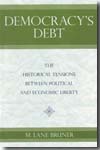Democracy's debt
the historical tensions between political and economic liberty
- ISBN: 9781591026778
- Editorial: Humanity Books
- Fecha de la edición: 2009
- Lugar de la edición: New York. Estados Unidos de Norteamérica
- Encuadernación: Cartoné
- Medidas: 24 cm
- Nº Pág.: 394
- Idiomas: Inglés

It is an undeniable fact that economic circumstances can directly impact political affairs, that wealth is easily translated into political influence, and that political movements and constitutional arrangements can directly influence economic environments. There is no consensus, however, on how to best manage the tensions between the production and maintenance of wealth and the just and responsible exercise of political power. In an in-depth analysis of these historic tensions, Professor of Communication, M Lane Bruner surveys the history of argumentation related to wealth and statecraft, and, more importantly, the actual economic and political practices in republican polities of the past to compare arguments to policies.The overriding goal of the study is to analyse which forms of governance have provided the most important guides for the reform of contemporary institutions in charge of global governance. Bruner begins by discussing the interrelationships among forces of the state, the market, and argumentation, and then summarises the historical 'triumph' of economic liberty over political liberty. Next he provides a brief history of the idea of free trade and associated economic argent from ancient Greece to the eighteenth century.Subsequent chapters focus on the Italian Renaissance republics as the first historical example of the problematic relationship between republicanism and economic practice on the tensions between economics and politics as reflect England's 'financial revolution' in the seventeenth and eighteenth centuries; on the American revolution and the economic struggles surrounding the development of the US Constitution; on the rise of economic globalisation and attempts to create a 'global constitution' for international finance; and, finally, on the dominant rhetorical strategies in the current globalisation debate and the future trajectory of global constitutionalism.Using illuminating historical analysis and compelling argumentation, Bruner ad






